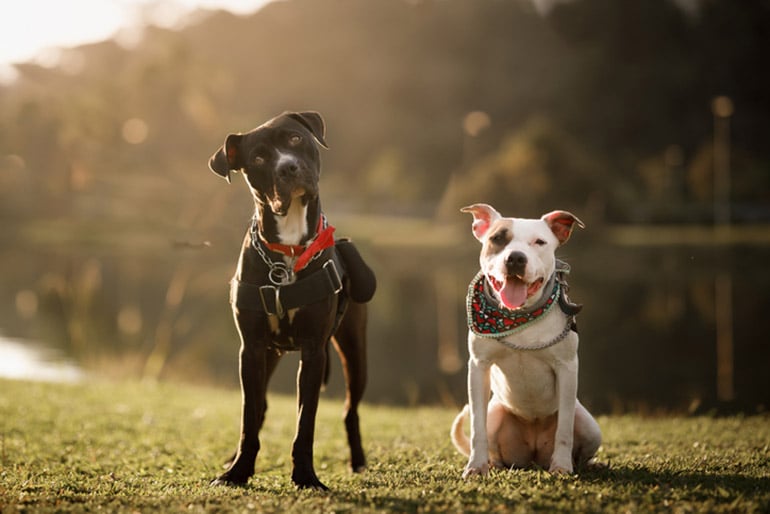If you’re a pet parent, one of the most stressful things about traveling for work or for leisure is leaving your beloved furbabies behind at home. Even when you’re leaving your pets at the home of a friend or family member familiar with your animal, or even having them house-sit at your own residence, it’s hard not to worry about what could go wrong. Multiply that concern by a hundred when you’re leaving your precious pet with someone unknown at a pet facility! Which is, unfortunately, the only option for many. Because as our Ask a Pro expert Victoria Schade, a contributor for Covetrus Great Pet Care, aptly puts it, “When you leave your dog at a boarding facility, their life is in someone else’s hands.”
Yet, as she tells us, “Almost one quarter (23%) of Americans prefer to vacation during the winter, underscoring the importance of finding a safe, affordable and trustworthy boarding facility for your pet.”
As an experienced dog trainer, pet book author, and petcare professional, Schade shares her best advice for finding the right fit for your four-legged child so that you can sip sangrias in the sunshine knowing your dog is experiencing a staycation of their own.
Is my dog suited for boarding at a pet hotel or daycare?
Schade says, “It’s critical to do thorough research, find the right facility for your individual dog, and prepare your pooch adequately for their new situation.” As she points out, “Boarding is only an option for dogs who have the right temperament and can stay calm and happy in multiple situations,” so finding the correct fit is really important.
For instance, if your dog doesn’t like playing with other dogs or gets defensive, a group play option may not be best. Or if your dog is approaching their senior stage of life and their energy level is waning, it might not be worth getting the all-day playcare option when one session of play might be all they need to feel satisfied. On the other hand, if your dog is very social and doesn’t like being left alone, a facility with overly long rest and reset breaks may not be the best format.
However, don’t rule out social doggy daycare facilities out entirely even if your dog isn’t into group play! While supervised playcare has become the norm when not boarding at a vet or kennel, most offer a private play/walk and stay option for older dogs, reactive canines, rowdy pups, and other personalities that play in a pack may not be right for.
What should I look for?
You’ll want to visit the facility before you commit to spending hundreds of dollars entrusting your pet’s care to a doggy daycare or pet hotel, but in some areas, the amount of options can be overwhelming. In many major metropolitan areas with active, busy airports, there are often many businesses that cater to this need … more than you have time to visit!
The good news is that there’s quite a bit of research you can begin right from home. Before you schedule a tour, go online and create your shortlist based on what you find that meets Schade’s criteria:
- Clean and Safe Environment: A well-maintained and secure facility is essential for your dog's health and happiness. This includes elements like adequate fencing, separate spaces for big dogs and little dogs, and “airlock” entry points to prevent escape.
- Engaging Activities: Look for a daycare that offers stimulating activities and playtime to keep your dog mentally and physically active. Activities can (and should!) be tailored to the dog’s breed, age and overall health, so make sure the experts on staff can share specifics.
- Positive Reviews: Check online reviews like local neighborhood resources) and ask each daycare for referrals from other dog owners to gauge the daycare's reputation.
- Communication: Choose a daycare that communicates regularly about your dog's activities and well-being.
What should I ask?
Research “could mean asking for recommendations from friends and family, checking reviews, and arranging a site visit,” Schade advises. After you do that due diligence, there are several questions you’ll still want to make sure you ask.
According to Schade and Covetrus Great Pet Care, you’ll want to inquire about:
- Dog-to-Staff Ratio: What is the dog-to-staff ratio during the day? A good dog-to-staff ratio is ideally 10:1 and no more than 15:1. Personalized attention and supervision are essential to a pets’ well-being.
- Staff Expertise: Is the staff trained in animal body language, behavior, and group management? A knowledgeable team can better understand your dog's needs and ensure a harmonious playgroup.
- Health Requirements: Understand how the daycare manages illness and protects your pet against the spread of diseases. Does the daycare require proof of vaccinations and heartworm prevention? This will ensure the animals your pet comes into contact with are protected against potentially harmful infectious diseases.
- Incident Assessment: What is your incident assessment procedure? Knowing how the daycare handles unforeseen situations ensures your dog's safety and your peace of mind.
- Trial Period: Do you require a trial run for attendees prior to boarding? This can help assess a dog’s temperament and how well they get along with other dogs.
What should I be wary of?
Just as Schade laid out some great green flags of things to look for, she also points out that there are also some easily identifiable signs that a petcare place may not be right for you.
“Potential red flags include inadequate training – staff that lacks training in animal behavior and group management may not be equipped to handle various dog personalities,” she cautions. You should also keep an eye out to see how attentive play supervisors are being when you visit. And if you can’t get more information on their training, that points to another warning sign that she sums up as “lack of transparency,” as “a reluctance to share incident assessment procedures or sick protocols may indicate potential issues.”
The most obvious one Schade mentions is perhaps poor hygiene. While you can expect a dog care facility to smell … well, doggy, straight-up “dirty or unkempt facilities can post health risks to your dog.” Play areas should be cleaned frequently and free of waste, and kennels should also be tidy and free of residue, torn up materials, vomit, or any other excrement.
How do I prepare my dog for boarding?
The number one item you’ll need in order to bring your dog to a reputable sleepover facility, Schade says, is up-to-date vaccination records. This is non-negotiable for a safe environment, and will encompass basic rabies and Bordetella, which is kennel cough, a highly contagious respiratory illness for dogs. Bear in mind that some places may require Bordetella shots to be as current as within six months. Some may also require canine influenza vaccines.
Many doggy daycare facilities will require a free or paid temperament test to ensure that your dog is suited for play with others, and will suggest at least a few full days of playcare prior to overnight boarding to ensure that they’ve had time to get acquainted and comfortable with the facility, staff, and “regulars.” Building familiarity will help alleviate your dog’s stress for extended stays.
They will all have different policies on if you need to bring a bed and are permitted to bring their toys, but most will require you to provide food from home (to avoid stomach upset from unfamiliar food) divided into separate bags pre-measured for each meal. If applicable, you’ll need to provide any medication or supplements your dog requires regularly, and instructions. Charges for administering this may apply, depending on the place you choose.
Final thoughts from our Pro
Schade’s takeaway is simple. “Remember, just as every dog is different, so are the facilities that cater to them. By asking the right questions and keeping an eye out for red flags, you can find the perfect doggy daycare and boarding center that suits your furry friend's individual needs, ensuring a positive, tail-wagging experience every day” … which ultimately, is all we want for our beloved puppy pals.
We all know how important it is to Plan with a Pro when it comes to travel. After all, Travel Advisors Get You There. But equally important is making sure advisor pros are supported and surrounded by pros themselves, particularly when it comes to topics peripheral to travel. That’s where TravelBlogue comes in as we Ask a Pro on your behalf to provide you with tips and advice from fitness, health, nutrition, mental health, beauty, wellness, and travel gear experts from around the world … and put it all at advisor fingertips.








